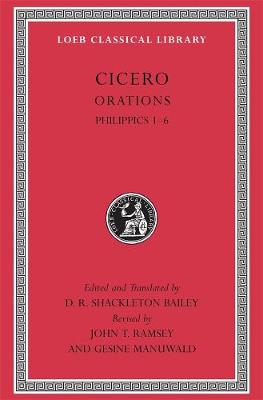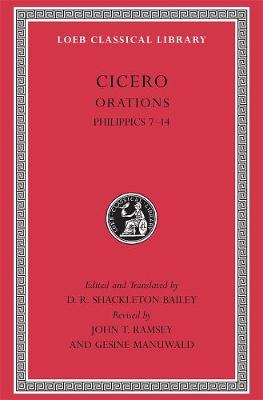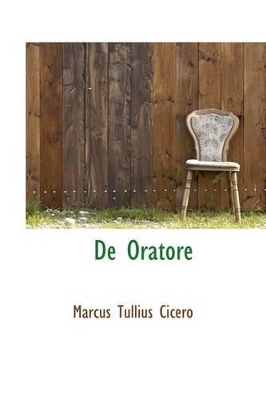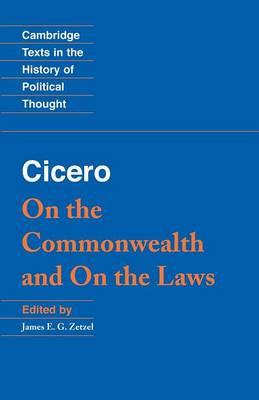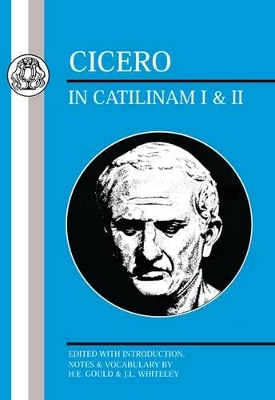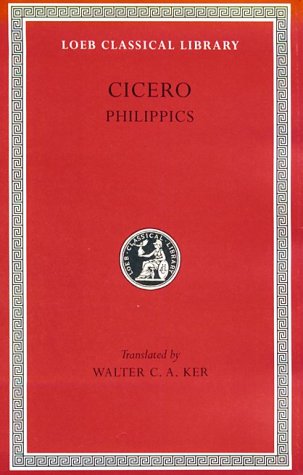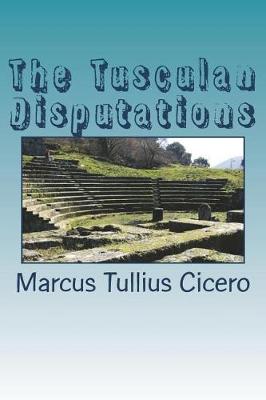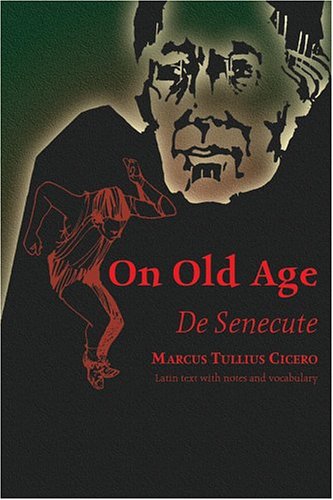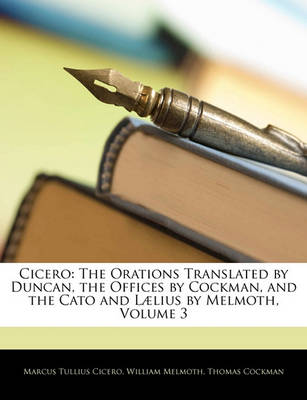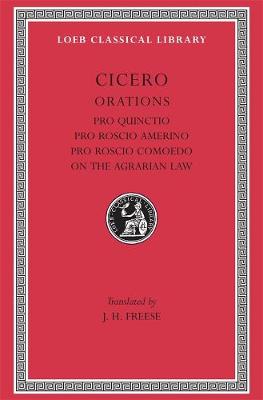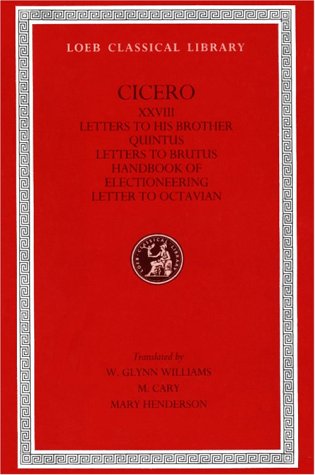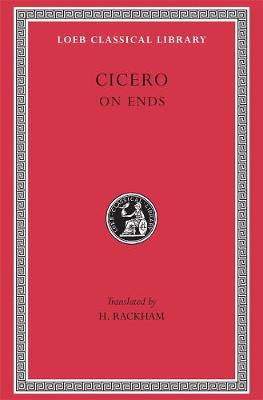Loeb Classical Library
3 primary works • 29 total works
Book 189
Cicero (Marcus Tullius, 106 43 BCE), Roman advocate, orator, politician, poet, and philosopher, about whom we know more than we do of any other Roman, lived through the stirring era that saw the rise, dictatorship, and death of Julius Caesar in a tottering republic. In Cicero's political speeches and in his correspondence we see the excitement, tension and intrigue of politics and the part he played in the turmoil of the time. Of about 106 speeches, 58 survive (a few incompletely), 29 of which are addressed to the Roman people or Senate, the rest to jurors. In the fourteenth century Petrarch and other Italian humanists discovered manuscripts containing more than 900 letters, of which more than 800 were written by Cicero, and nearly 100 by others to him. This correspondence affords a revelation of the man, all the more striking because most of the letters were not intended for publication. Six works on rhetorical subjects survive intact and another in fragments. Seven major philosophical works are extant in part or in whole, and there are a number of shorter compositions either preserved or known by title or fragments. Of his poetry, some is original, some translated from the Greek.
The Loeb Classical Library edition of Cicero is in twenty-nine volumes.
Book 252
Cicero (Marcus Tullius, 106-43 BCE), Roman lawyer, orator, politician and philosopher, of whom we know more than of any other Roman, lived through the stirring era which saw the rise, dictatorship, and death of Julius Caesar in a tottering republic. In his political speeches especially and in his correspondence we see the excitement, tension and intrigue of politics and the part he played in the turmoil of the time. Of about 106 speeches, delivered before the Roman people or the Senate if they were political, before jurors if judicial, 58 survive (a few of them incompletely). In the fourteenth century Petrarch and other Italian humanists discovered manuscripts containing more than 900 letters of which more than 800 were written by Cicero and nearly 100 by others to him. These afford a revelation of the man all the more striking because most were not written for publication. Six rhetorical works survive and another in fragments. Philosophical works include seven extant major compositions and a number of others; and some lost. There is also poetry, some original, some as translations from the Greek.
The Loeb Classical Library edition of Cicero is in twenty-nine volumes.
Book 507
Cicero (Marcus Tullius, 106 43 BCE), Roman advocate, orator, politician, poet, and philosopher, about whom we know more than we do of any other Roman, lived through the stirring era that saw the rise, dictatorship, and death of Julius Caesar in a tottering republic. In Cicero's political speeches and in his correspondence we see the excitement, tension and intrigue of politics and the part he played in the turmoil of the time. Of about 106 speeches, 58 survive (a few incompletely), 29 of which are addressed to the Roman people or Senate, the rest to jurors. In the fourteenth century Petrarch and other Italian humanists discovered manuscripts containing more than 900 letters, of which more than 800 were written by Cicero, and nearly 100 by others to him. This correspondence affords a revelation of the man, all the more striking because most of the letters were not intended for publication. Six works on rhetorical subjects survive intact and another in fragments. Seven major philosophical works are extant in part or in whole, and there are a number of shorter compositions either preserved or known by title or fragments. Of his poetry, some is original, some translated from the Greek.
The Loeb Classical Library edition of Cicero is in twenty-nine volumes.
Cicero (Marcus Tullius, 106-43 BCE), Roman lawyer, orator, politician and philosopher, of whom we know more than of any other Roman, lived through the stirring era which saw the rise, dictatorship, and death of Julius Caesar in a tottering republic. In his political speeches especially and in his correspondence we see the excitement, tension and intrigue of politics and the part he played in the turmoil of the time. Of about 106 speeches, delivered before the Roman people or the Senate if they were political, before jurors if judicial, 58 survive (a few of them incompletely). In the fourteenth century Petrarch and other Italian humanists discovered manuscripts containing more than 900 letters of which more than 800 were written by Cicero and nearly 100 by others to him. These afford a revelation of the man all the more striking because most were not written for publication. Six rhetorical works survive and another in fragments. Philosophical works include seven extant major compositions and a number of others; and some lost. There is also poetry, some original, some as translations from the Greek.
The Loeb Classical Library edition of Cicero is in twenty-nine volumes.
v. 7
In letters to his dear friend Atticus, Cicero reveals himself as to no other of his correspondents except, perhaps, his brother. These letters, in this four-volume series, also provide a vivid picture of a momentous period in Roman history--years marked by the rise of Julius Caesar and the downfall of the Republic.
When the correspondence begins in November 68 BCE the 38-year-old Cicero is a notable figure in Rome: a brilliant lawyer and orator, who has achieved primacy at the Roman bar and a political career that would culminate in the Consulship in 63. Over the next twenty-four years--to November 44, a year before he was put to death by the forces of Octavian and Mark Antony--Cicero wrote frequently to his friend and confidant, sharing news and discussing affairs of business and state. It is to this corpus of over 400 letters that we owe most of our information about Cicero's literary activity. And taken as a whole the letters provide a first-hand account of social and political life in Rome.
The Letters to His Friends
by Marcus Tullius Cicero and William Glynn Williams
Cicero (Marcus Tullius, 106-43 BCE), Roman lawyer, orator, politician and philosopher, of whom we know more than of any other Roman, lived through the stirring era which saw the rise, dictatorship, and death of Julius Caesar in a tottering republic. In his political speeches especially and in his correspondence we see the excitement, tension and intrigue of politics and the part he played in the turmoil of the time. Of about 106 speeches, delivered before the Roman people or the Senate if they were political, before jurors if judicial, 58 survive (a few of them incompletely). In the fourteenth century Petrarch and other Italian humanists discovered manuscripts containing more than 900 letters of which more than 800 were written by Cicero and nearly 100 by others to him. These afford a revelation of the man all the more striking because most were not written for publication. Six rhetorical works survive and another in fragments. Philosophical works include seven extant major compositions and a number of others; and some lost. There is also poetry, some original, some as translations from the Greek.
The Loeb Classical Library edition of Cicero is in twenty-nine volumes.
v. 205
Cicero (Marcus Tullius, 106-43 BCE), Roman lawyer, orator, politician and philosopher, of whom we know more than of any other Roman, lived through the stirring era which saw the rise, dictatorship, and death of Julius Caesar in a tottering republic. In his political speeches especially and in his correspondence we see the excitement, tension and intrigue of politics and the part he played in the turmoil of the time. Of about 106 speeches, delivered before the Roman people or the Senate if they were political, before jurors if judicial, 58 survive (a few of them incompletely). In the fourteenth century Petrarch and other Italian humanists discovered manuscripts containing more than 900 letters of which more than 800 were written by Cicero and nearly 100 by others to him. These afford a revelation of the man all the more striking because most were not written for publication. Six rhetorical works survive and another in fragments. Philosophical works include seven extant major compositions and a number of others; and some lost. There is also poetry, some original, some as translations from the Greek.
The Loeb Classical Library edition of Cicero is in twenty-nine volumes.
No 189
No 342
Brutus gives an account of the Roman tradition of public and law-court speeches from its beginning to what Cicero described as the polished and entertaining speeches of his own day. Along the way Cicero has interesting things to say about the influence of the speaker's audience on his style and technique. Also notable here is an autobiographical sketch.
Cicero's own very wide practical experience informs Orator, which depicts the ideal speaker. Here he details the principles of eloquent oratory and quotes instructive examples. Both works date from 46 BCE and are dedicated to the author's promising young friend, Brutus, later famous in the conspiracy against Caesar.
No 124
Cicero (Marcus Tullius, 106-43 BCE), Roman lawyer, orator, politician and philosopher, of whom we know more than of any other Roman, lived through the stirring era which saw the rise, dictatorship, and death of Julius Caesar in a tottering republic. In his political speeches especially and in his correspondence we see the excitement, tension and intrigue of politics and the part he played in the turmoil of the time. Of about 106 speeches, delivered before the Roman people or the Senate if they were political, before jurors if judicial, 58 survive (a few of them incompletely). In the fourteenth century Petrarch and other Italian humanists discovered manuscripts containing more than 900 letters of which more than 800 were written by Cicero and nearly 100 by others to him. These afford a revelation of the man all the more striking because most were not written for publication. Six rhetorical works survive and another in fragments. Philosophical works include seven extant major compositions and a number of others; and some lost. There is also poetry, some original, some as translations from the Greek.
The Loeb Classical Library edition of Cicero is in twenty-nine volumes.
v. 216
This useful student text, first published in 1893, consists of an
introduction covering the historical background to Milo's trial for the
murder of Clodius in 52 BC, the political significance of the trial,
and Cicero's treatment of the case. The Latin text of the speech is
followed by extensive notes, a short analysis of the structure of the
speech, and indexes. Finally, Asconius' commentary (in Latin) is
included.
Cicero (Marcus Tullius, 106-43 BCE), Roman lawyer, orator, politician and philosopher, of whom we know more than of any other Roman, lived through the stirring era which saw the rise, dictatorship, and death of Julius Caesar in a tottering republic. In his political speeches especially and in his correspondence we see the excitement, tension and intrigue of politics and the part he played in the turmoil of the time. Of about 106 speeches, delivered before the Roman people or the Senate if they were political, before jurors if judicial, 58 survive (a few of them incompletely). In the fourteenth century Petrarch and other Italian humanists discovered manuscripts containing more than 900 letters of which more than 800 were written by Cicero and nearly 100 by others to him. These afford a revelation of the man all the more striking because most were not written for publication. Six rhetorical works survive and another in fragments. Philosophical works include seven extant major compositions and a number of others; and some lost. There is also poetry, some original, some as translations from the Greek.
The Loeb Classical Library edition of Cicero is in twenty-nine volumes.
Cicero (Marcus Tullius, 106-43 BCE), Roman lawyer, orator, politician and philosopher, of whom we know more than of any other Roman, lived through the stirring era which saw the rise, dictatorship, and death of Julius Caesar in a tottering republic. In his political speeches especially and in his correspondence we see the excitement, tension and intrigue of politics and the part he played in the turmoil of the time. Of about 106 speeches, delivered before the Roman people or the Senate if they were political, before jurors if judicial, 58 survive (a few of them incompletely). In the fourteenth century Petrarch and other Italian humanists discovered manuscripts containing more than 900 letters of which more than 800 were written by Cicero and nearly 100 by others to him. These afford a revelation of the man all the more striking because most were not written for publication. Six rhetorical works survive and another in fragments. Philosophical works include seven extant major compositions and a number of others; and some lost. There is also poetry, some original, some as translations from the Greek.
The Loeb Classical Library edition of Cicero is in twenty-nine volumes.
Pro Quinctio. Pro Roscio Amerino. Pro Roscio Comoedo. On the Agrarian Law
by Marcus Tullius Cicero
Cicero (Marcus Tullius, 106-43 BCE), Roman lawyer, orator, politician and philosopher, of whom we know more than of any other Roman, lived through the stirring era which saw the rise, dictatorship, and death of Julius Caesar in a tottering republic. In his political speeches especially and in his correspondence we see the excitement, tension and intrigue of politics and the part he played in the turmoil of the time. Of about 106 speeches, delivered before the Roman people or the Senate if they were political, before jurors if judicial, 58 survive (a few of them incompletely). In the fourteenth century Petrarch and other Italian humanists discovered manuscripts containing more than 900 letters of which more than 800 were written by Cicero and nearly 100 by others to him. These afford a revelation of the man all the more striking because most were not written for publication. Six rhetorical works survive and another in fragments. Philosophical works include seven extant major compositions and a number of others; and some lost. There is also poetry, some original, some as translations from the Greek.
The Loeb Classical Library edition of Cicero is in twenty-nine volumes.
No 462
The Letters to Quintus, Brutus, Octavian and Commentariolum Petitionis
by Marcus Tullius Cicero
No 40
Cicero (Marcus Tullius, 106 43 BCE), Roman lawyer, orator, politician and philosopher, of whom we know more than of any other Roman, lived through the stirring era which saw the rise, dictatorship, and death of Julius Caesar in a tottering republic. In his political speeches especially and in his correspondence we see the excitement, tension and intrigue of politics and the part he played in the turmoil of the time. Of about 106 speeches, delivered before the Roman people or the Senate if they were political, before jurors if judicial, 58 survive (a few of them incompletely). In the fourteenth century Petrarch and other Italian humanists discovered manuscripts containing more than 900 letters of which more than 800 were written by Cicero and nearly 100 by others to him. These afford a revelation of the man all the more striking because most were not written for publication. Six rhetorical works survive and another in fragments. Philosophical works include seven extant major compositions and a number of others; and some lost. There is also poetry, some original, some as translations from the Greek.
The Loeb Classical Library edition of Cicero is in twenty-nine volumes.
